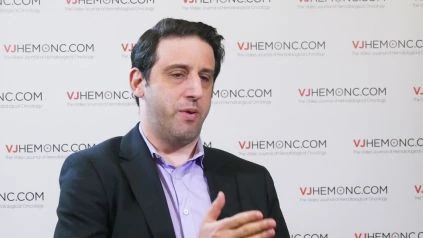Eytan Stein, MD, from the Memorial Sloan Kettering Cancer Center, New York, NY, discusses the mechanisms of resistance to targeted therapies such as enasidenib and ivosidenib in acute myeloid leukemia (AML). Primary resistance, defined by a complete lack of response to the drug, is mediated by co-occurring mutations and is most common in patients with FLT3, JAK and Ras mutations. Secondary resistance, where the patient relapses after achieving remission on the drug, is primarily mediated through the clonal outgrowth of different clones, such as different FLT3, Ras or isocitrate dehydrogenase (IDH) mutations. This video was recorded at the 2018 European School of Hematology (ESH) Clinical Updates on Acute Leukemias, held in Budapest, Hungary.
[the_ad id="32629"]

